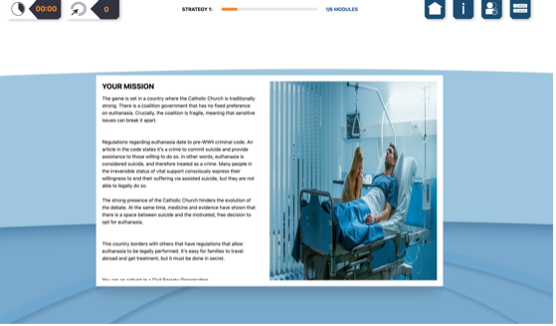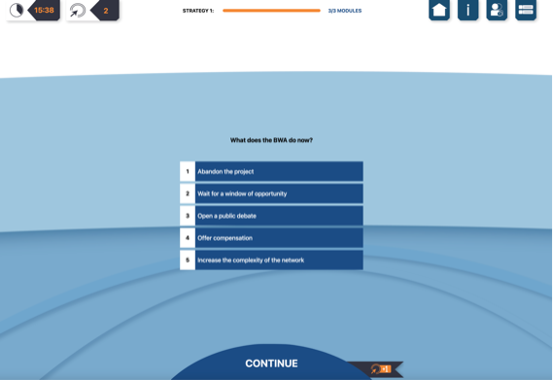Imagine you are an activist within a Civil Society Organisation fighting for the right to euthanasia for terminally ill patients. The topic is complex, decisive and controversial. Some groups support the initiative, while others are ambivalent or opposed. It’s your mission to deploy different policy-making strategies, from grassroots to European legislation, in order to sway the balance in your favour.
You are playing P-Cube.
A hands-on learning experience
P-Cube stands for Playing Public Policy. It is an interactive simulation game created to help players understand how decisions are taken in the public sphere. It’s also an innovative way to teach the theory of public policy making and experience it in action. Students step into the shoes of a “policy entrepreneur” at different governance levels to play through four game sets: Urban Innovation, Social innovation and Inclusion, Science and Public Policy and EU Decision Making. In these game sets, players are tasked with completing a series of fictitious missions based on real-life examples of policy changes including themes related to labour rights in the gig-economy, building a new metro line, the regulation of psychedelic drugs, animal welfare and many more.

A screenshot from the game introducing one of the many missions
In the game, players discover the tools of public policy making, such as referendums, civil disobedience, petitions and white papers by testing out their effectiveness in different scenarios. Detailed feedback is given to players at all steps of the way, and the immersive experience helps to deepen students’ understanding. Players think strategically, making informed choices and navigating the consequences. They must work through dead ends, and sometimes accept that the policy innovations are simply not feasible due to lack of resources or support.

A screenshot of the game giving players a choice to make
EU policy-making missions developed at the University of Luxembourg
The project, co-funded by the Erasmus + programme of the European Union, was overseen by a consortium of partners from six countries representing both academic and civil society. Professors Herwig Hofmann and Jacques Ziller from the University of Luxembourg and developed the EU policy-making scenarios of the game. The three-year project began in 2021, with the game becoming available at the end of 2024.
The four EU policy-making missions are designed to enable participants to acquire the minimum knowledge of EU institutions, bodies and offices that is needed to understand the functioning of the EU, and for participants who already have a formal knowledge, like law students, to understand how legal rules operate in practice. Players also experience the interplay between institutions, their scope of operations, and available mechanisms for policy change.
Deployed into the classroom
P-Cube is now being used in the classroom with Luxembourg law students. “Students dive into decision-making with the help of the gaming experience. It is an exercise of strategic thinking and learning what it means to put theory into practice”, Hofmann finds after the first rounds of teaching with the tool.
The mobilisation of support, careful choice of strategies and analysis of available resources are only some of the many moving parts within public policy making. By creating an innovative and gamified approach, P-Cube project partners have built a custom tool for students in higher education to facilitate learning, consolidate knowledge and ultimately develop an appreciation for the process.
More information about P-Cube, including resources for educators, literature reviews and a link to request game access can be found on https://www.p-cube-project.eu/.
